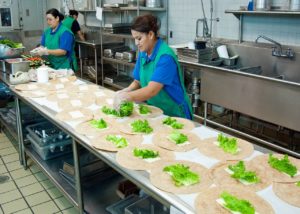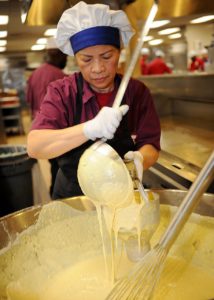Jewish Food Society Aims to Honor the Global Wonders of Jewish Food
 “Recently, over a bag of schmaltz-infused popcorn, 90 people came together in lower Manhattan to celebrate the formation of the Jewish Food Society, a new organization which aims to honor the global wonder of Jewish food.” – the Salt, NPR
“Recently, over a bag of schmaltz-infused popcorn, 90 people came together in lower Manhattan to celebrate the formation of the Jewish Food Society, a new organization which aims to honor the global wonder of Jewish food.” – the Salt, NPR
Before founding the society, Naama Shefi worked for Eat With, a company focused on dinners inside people’s homes; and hosted a 21-day Iraqi-Jewish food pop-up featuring kubbeh, a food that Shefi craved but could not find easily in the city.
It becomes clear when reading about Shefi’s personal and professional path, which has seemingly led her always to food, it has also led her to passionately embrace her culture and family tradition. Her dedication to community is an inspiration to many in our good food movement, trying to preserve food heritage and culture no matter what your background might be! I think someone should tell her (if she doesn’t already know!) about Slow Food and our principles which guide us all to achieve similar dreams!
 This coming weekend (and next!) I know there will be many celebrations around the globe, including all sorts of people and all kinds of food, but what is most important about these memorable times is that we come together with loved ones around a communal table. I hope that is a part of everybody’s celebration and why I absolutely loved this NY Times article. I’ve included an excerpt below (if you don’t have time to read the entire piece) which I think best highlights again, the importance of sharing a meal, no matter what your beliefs or affiliation might be.
This coming weekend (and next!) I know there will be many celebrations around the globe, including all sorts of people and all kinds of food, but what is most important about these memorable times is that we come together with loved ones around a communal table. I hope that is a part of everybody’s celebration and why I absolutely loved this NY Times article. I’ve included an excerpt below (if you don’t have time to read the entire piece) which I think best highlights again, the importance of sharing a meal, no matter what your beliefs or affiliation might be.
“Whichever traditions we might be putting into practice over Easter weekend, or the eight days of Passover, they’ll be serving two purposes. On the one hand, they are symbolic, providing a platform for all of us to connect with a shared story. On the other hand, these same traditions allow us to connect personally with the history we are making within our own family and circle of friends, last year and the year before that and the year before that, when the kids were very young.” – NY Times, Inviting the Easter Bunny to Seder
Revenue Sharing Helps to Close Wage Gaps For Restaurant Workers
 According to an article published by NPR, “in cities like San Francisco and Boston, restaurants are facing a shortage of kitchen staff, caused largely by low pay.” The problem is traced back to a wage gap between tipped and non-tipped employees.
According to an article published by NPR, “in cities like San Francisco and Boston, restaurants are facing a shortage of kitchen staff, caused largely by low pay.” The problem is traced back to a wage gap between tipped and non-tipped employees.
Thus, in an effort to bridge that gap and attract more kitchen workers, some restaurants are now trying an experiment: revenue sharing, that is, to take a percentage of sales and funnel it back to the kitchen workers. Currently, revenue sharing seems to be confined to a handful of wealthy cities on the East and West coasts. But it’s taking off in California, and is called by Sharokina Shams in the Bay Area as “the emerging new norm.”
 It’s no mystery that increasing minimum wage has been at the forefront of addressing issues in social justice and public health for years. And social justice activists and advocates across the board suggest that winning the ‘fight for fifteen‘ would solve many problems concerning the unequal distribution of wealth, racial and gender discrimination, and much, much more. As it relates to the good food movement, we know that when people are paid an appropriate living wage they are more likely to afford and actually buy fresh, local and healthy food. I for one would like to see more of that!
It’s no mystery that increasing minimum wage has been at the forefront of addressing issues in social justice and public health for years. And social justice activists and advocates across the board suggest that winning the ‘fight for fifteen‘ would solve many problems concerning the unequal distribution of wealth, racial and gender discrimination, and much, much more. As it relates to the good food movement, we know that when people are paid an appropriate living wage they are more likely to afford and actually buy fresh, local and healthy food. I for one would like to see more of that!
In U.S. Restaurants, Bars And Food Trucks, ‘Modern Slavery’ Persists
 “In restaurants, bars and food trucks across America, many workers are entrapped in a form of modern slavery. That’s according to a new report by Polaris, an organization that fights human trafficking and helps survivors.
“In restaurants, bars and food trucks across America, many workers are entrapped in a form of modern slavery. That’s according to a new report by Polaris, an organization that fights human trafficking and helps survivors.
In the report, the group offers a detailed portrait of human trafficking as it occurs in the U.S., breaking it down into 25 distinct business models, from nail salons to hotel work and domestic service.” – NPR, the Salt
The Global Dangers of Industrialized Meat
After the recent scandal in Brazil concerning rancid meat, many people are looking at the industrialized meat system more closely (finally! thank goodness!). There are several reports of companies risking public safety to keep their products on the shelves (ahem, Monsanto, I’m talking about you!), so how are we supposed to trust what’s in our supermarkets and on our shelves without transparency or enforced standards of regulation? Well, we cant!
 We must resist and fight back against corporate control of our food system and instead support small-scale farmers who grow, using methods not only safe for us and our children, but also the earth! We must know that change is possible, if we stop ‘propping up the meat market’ either by abstaining completely or sourcing directly from farmers you can trust!
We must resist and fight back against corporate control of our food system and instead support small-scale farmers who grow, using methods not only safe for us and our children, but also the earth! We must know that change is possible, if we stop ‘propping up the meat market’ either by abstaining completely or sourcing directly from farmers you can trust!

Comments are closed.